Reviews
James Cameron
UK/USA, 1984
Credits
Review by Rumsey Taylor
Posted on 16 August 2013
Source MGM BRD
Categories Favorites: The Apocalypse
In a magisterial tracking shot, the composition surveys a landscape that’s been eviscerated by war. The sky is dark, the scene is illuminated expressly by bright neon lasers and scored in the sound of bombs thundering in the background. There is no sign of life, but much evidence of its prior existence: as the shot continues forward, it encloses bits of rubble, which are constituted of human bones. The composition pauses on a single petrified skull, and just as the disarming inference of this image is comprehended - that the whole of human life is reduced to this uniform field of bleached, disassembled skeletons - it is suddenly interrupted by a robotic but peculiarly humanoid appendage stepping sharply into the frame. The skull is crushed to bits, and the composition pans up the body of its cyborg destroyer, who stares at us with merciless red eyes and stands poised with an enormous gun, erect at its hilt and readied toward any moving bit of human flesh that may surface in its proximity.
Accordingly, Terminator 2: Judgement Day opens with perhaps the most succinct distillation of technological singularity in all of cinema. Its author, James Cameron, has long since been become known as a filmmaker of considerable excess, a reputation that sharply contradicts his strengths in economy filmmaking and summary mise-en-scène—strengths that refer specifically to one of his two films that would qualify as budget filmmaking: 1984’s The Terminator, a muscly action picture of the highest order, and an exemplar of ambition unembellished by special effects.
Its central narrative conceit is a time paradox that affects a single character, Sarah, the unassuming female that unwittingly becomes a person of preeminent value to two wholly indiscreet bounty hunters. She is a pretty young girl, whose obvious effervescence endears her to most all around her, save for her customers at a shitty waitress job, and her life is a redundant middle-class routine of work and occasional social frustration. Her biggest ambition, it seems, is to find a guy to go steady with, and failing this she opts for a slice of pizza and a night at a dance club. Stood up and lamenting another bum date, she’s oblivious to the crowd of people dancing around her, but startled back into consciousness by a laser sight aimed directly between her disbelieving eyes.
The aim holds long enough for Sarah to comprehend its source: an abstract, frown-mouthed hulk of a man, whose monstrous stature exceeds that of everyone else in the room. Another gun goes off from somewhere else, and the man’s aim falters. Sarah scurries away in panic, party to a maelstrom of chaos that will very likely accompany the rest of her life.
She’s collected by the unseen of the two shooters, Kyle, who futilely assures her that he’s the good guy. He’d be hard to believe were it not for his pronounced handsomeness and serious belief in what he tells her, as well as his composed tenor in describing something no one has heard before: he’s been sent from the future, to protect Sarah from an assassin from another time and space, a robot designed expressly to kill her with indefatigable resolve. “It’s called a terminator,” he says at a point at which no other name would seem as appropriate, given the persistence their would-be killer has thus far ably demonstrated.
Kyle and the terminator are from a post-apocalyptic world that, in the little we see of it, has reduced humanity to a subterranean network of makeshift militia and the disabled. It looks like an urbanized leper colony, which explains Kyle’s immunity to putting himself in harm’s way. His plight has a sense of urgency because in helping Sarah he foresightedly assails the technological warfare that has raped his present of all meaningful experience save for the embittered triumph of conflict. Sarah empathizes with Kyle, it seems, not only because of his convincingness but because he interrupts the tedium of her life. He’s a fantasy, arrived to invest her normality with importance. Feeling this importance for the first time, she accompanies him on the charade, even if the moments of catharsis and intimacy it permits are underscored with the constant threat of death.
For most of the film, Sarah and Kyle and the terminator are shown in isolation, which is to say that film has essentially no supporting characters. Even in the final sequence, which involves a tanker explosion in an urban area and an array of pipe bombs that attract no police in their aftermath, it’s just the three of them, so the film stages no responsibility in considering what is fundamentally a global threat: that the apocalypse is imminent, and it will be manifested in a machine whose singular purpose is to obliterate mankind.
Sarah and Kyle are captured by police midway through, and this permits an opportunity for Kyle to share his story with someone other than Sarah. He’s seated in a chair, his hands cuffed behind his back, and addresses a roomful of incredulous onlookers. To his immediate right is a legal psychologist, and above him a surveillance camera. “You still don’t get it, do you?! He’ll find her! That’s what he does! It’s all he does!” he screams, glaring straight at the sole technological member of his audience with such intensity that no one has the tactlessness to laugh.
The film is at its best in this scene, because it presents its outlandish preposterousness with such a straight face that the eponymous villain becomes scary to us, too. His impermeability, strength, and prowess in gunplay are - while impressive - unbelievable because they render as inhuman. It’s the fear he causes in Kyle, and Sarah in turn, that makes him real.
At the end of the film Sarah rides alone toward the southwest, a revolver in her lap and a dog in the backseat (she learns from Kyle that they’re good a spotting terminators). She rides into the horizon in iconic Western fashion, only the horizon is pregnant with the threat of an oncoming storm. She drives unreservedly toward it.
More Favorites: The Apocalypse
-
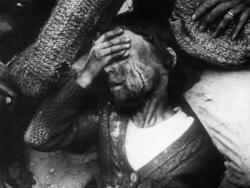
The War Game
1965 -

On The Beach
1959 -
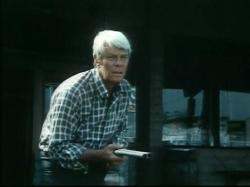
Where Have All the People Gone
1974 -

A Boy and His Dog
1975 -
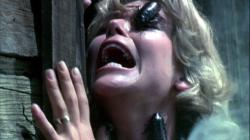
Bug
1975 -
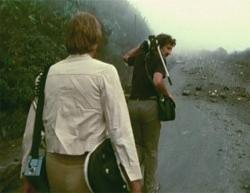
La Soufrière
1977 -
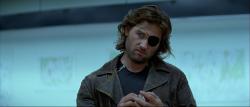
Escape from New York
1981 -
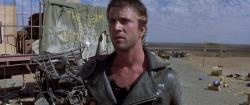
The Road Warrior
1981 -

Le Dernier Combat
1983 -
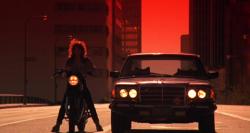
Night of the Comet
1984 -

Threads
1984 -
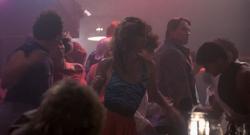
The Terminator
1984 -
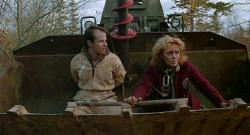
Def-Con 4
1984 -
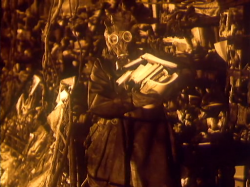
Letters From a Dead Man
1986 -
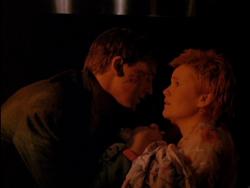
Miracle Mile
1988 -
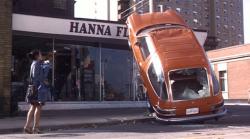
Last Night
1988 -

Last Days
2005 -

The Rapture
1991 -

Southland Tales
2006 -
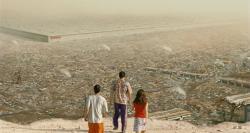
Idiocracy
2006 -
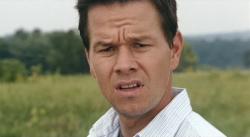
The Happening
2008 -

The Road
2009 -
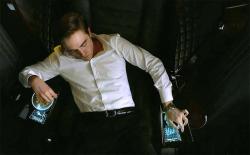
Cosmopolis
2012
We don’t do comments anymore, but you may contact us here or find us on Twitter or Facebook.



